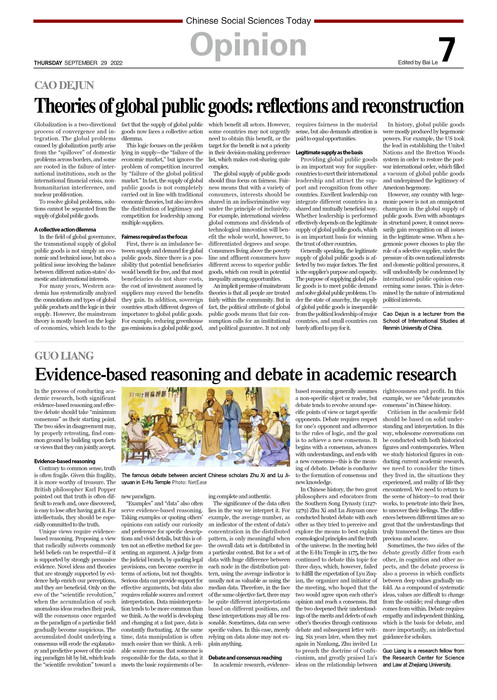Theories of global public goods: reflections and reconstruction
2022-09-29 14:23:25
Globalization is a two-directional process of convergence and integration. The global problems caused by globalization partly arise from the “spillover” of domestic problems across borders, and some are rooted in the failure of international institutions, such as the international financial crisis, non-humanitarian interference, and nuclear proliferation.
To resolve global problems, solutions cannot be separated from the supply of global public goods.
A collective action dilemma
In the field of global governance, the transnational supply of global public goods is not simply an economic and technical issue, but also a political issue involving the balance between different nation-states’ domestic and international interests.
For many years, Western academia has systematically analyzed the connotations and types of global public products and the logic in their supply. However, the mainstream theory is mostly based on the logic of economics, which leads to the fact that the supply of global public goods now faces a collective action dilemma.
This logic focuses on the problem lying in supply—the “failure of the economic market,” but ignores the problem of competition incurred by “failure of the global political market.” In fact, the supply of global public goods is not completely carried out in line with traditional economic theories, but also involves the distribution of legitimacy and competition for leadership among multiple suppliers.
Fairness required as the focus
First, there is an imbalance between supply and demand for global public goods. Since there is a possibility that potential beneficiaries would benefit for free, and that most beneficiaries do not share costs, the cost of investment assumed by suppliers may exceed the benefits they gain. In addition, sovereign countries attach different degrees of importance to global public goods. For example, reducing greenhouse gas emissions is a global public good, which benefit all actors. However, some countries may not urgently need to obtain this benefit, or the target for the benefit is not a priority in their decision-making preference list, which makes cost-sharing quite complex.
The global supply of public goods should thus focus on fairness. Fairness means that with a variety of consumers, interests should be shared in an indiscriminative way under the principle of inclusivity. For example, international wireless global commons and dividends of technological innovation will benefit the whole world, however, to differentiated degrees and scope. Consumers living above the poverty line and affluent consumers have different access to superior public goods, which can result in potential inequality among opportunities.
An implicit premise of mainstream theories is that all people are treated fairly within the community. But in fact, the political attribute of global public goods means that fair consumption calls for an institutional and political guarantee. It not only requires fairness in the material sense, but also demands attention is paid to equal opportunities.
Legitimate supply as the basis
Providing global public goods is an important way for supplier-countries to exert their international leadership and attract the support and recognition from other countries. Excellent leadership can integrate different countries in a shared and mutually beneficial way. Whether leadership is performed effectively depends on the legitimate supply of global public goods, which is an important basis for winning the trust of other countries.
Generally speaking, the legitimate supply of global public goods is affected by two major factors. The first is the supplier’s purpose and capacity. The purpose of supplying global public goods is to meet public demand and solve global public problems. Under the state of anarchy, the supply of global public goods is inseparable from the political leadership of major countries, and small countries can barely afford to pay for it.
In history, global public goods were mostly produced by hegemonic powers. For example, the US took the lead in establishing the United Nations and the Bretton Woods system in order to restore the post-war international order, which filled a vacuum of global public goods and underpinned the legitimacy of American hegemony.
However, any country with hegemonic power is not an omnipotent champion in the global supply of public goods. Even with advantages in structural power, it cannot necessarily gain recognition on all issues in the legitimate sense. When a hegemonic power chooses to play the role of a selective supplier, under the pressure of its own national interests and domestic political pressures, it will undoubtedly be condemned by international public opinion concerning some issues. This is determined by the nature of international political interests.
Cao Dejun is a lecturer from the School of International Studies at Renmin University of China.


